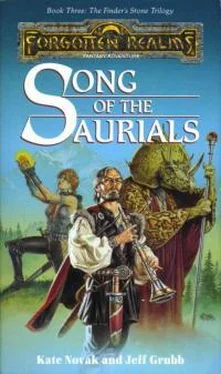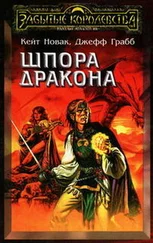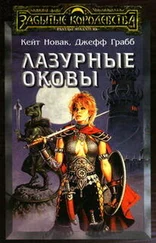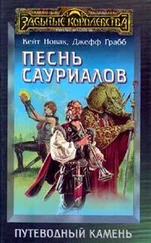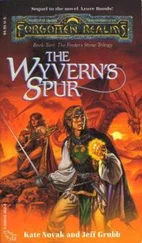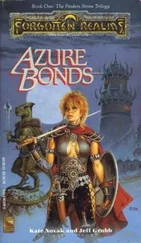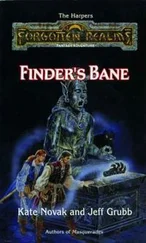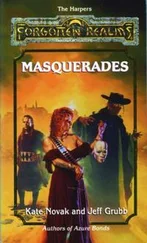“Alias,” Mourngrym replied, “you can’t spend the rest of your life doing everything exactly the way Nameless wants you to. You have to live your own life.”
“I know that,” Alias said unhappily, “but I don’t want to disappoint him by ruining his songs. If I was improving them, I could argue with him about it, but I’m only making the songs ugly and grotesque.”
Despite her claim to the contrary, his lordship didn’t believe Alias understood his advice. The bard’s enchantment of her went deeper than any magic. She loved Nameless, and she sang to please him. Trying to reassure her, Mourngrym said, “Sometimes we need frightening songs, whether we like them or not. They remind us what we stand for or against and give us the incentive to take action.”
“But I don’t know even know what these new songs are about, even though they’re coming out of my own head,” Alias objected. “How am I supposed to take action? Against what?”
Mourngrym had no answer. These were questions for sharper minds than his own. “Have you discussed any of this with Elminster?” he asked.
Alias shook her head. “I don’t want to bother him until he’s finished helping Nameless.”
Mourngrym shook his head. Alias was losing control of her voice, something that obviously frightened her, but she was more concerned about Nameless’s plight. His lordship wanted to tell Alias to forget Nameless for once, but he knew the sell-sword would not heed his words.
Dragonbait chirped and pointed toward the doorway. Alias turned to see a group of travelers entering the inn. There were a dozen or more of them, pulling off their rain-drenched cloaks and shouting requests for drinks and food and rooms to the inn’s staff. From their clothing, Alias guessed they were merchants and caravan guards from Cormyr. One man, however, had to be from much farther south. His skin was the dusky hue of a southerner. He wore silken red-and-white-striped robes, and a golden cord banded his curly brown hair. He stood taller than the other merchants and many of the guards.
“It can’t be,” Alias muttered. She craned her neck impatiently until the man turned around. In the manner of a Turmishman, he sported a square beard, and to indicate he was married, he wore a blue sapphire in his earlobe. The three blue dots on his forehead indicated he was a scholar of reading, magic, and religion. But these things hardly registered on Alias now. It was the familiarity of the man’s face that excited her. “It’s him!” she gasped. “Dragonbait, it’s Akabar! He’s come back to us!”
Alias rose to her feet, thrusting Scotty back at his surprised father, and ran to the door of the inn, crying out the Turmishman’s name.
A few heads swiveled to see who the swordswoman was calling to, but most of the inn’s occupants kept their attention on Han’s songhorn music and the dancers on the floor.
Akabar Bel Akash held his arms out to greet the sell-sword in a traditional handclasp, but Alias threw herself into his arms and embraced him like a long-lost brother. From where he sat, Mourngrym could tell from the look of surprise on the Turmishman’s face that Akabar hadn’t expected quite so warm a reception.
Mourngrym exchanged glances with Dragonbait. The saurial shrugged and turned back to watch the newcomers. His scaly brow knit with concern when he spied a woman standing behind Akabar.
Tugging on the southerner’s arm, Alias led Akabar back to her table. She didn’t seem to notice the heavily veiled woman who followed several paces behind them. Mourngrym did, however, and he rose to his feet with Scotty seated in the crook of his arm.
“Mourngrym, you remember Akabar bel Akash?” Alias asked. “He was a member of my party when I first visited Shadowdale.”
“The ‘mage of no small water,’ ” Mourngrym said, recalling the phrase Akabar had often used.
Akabar bowed low. “I’m honored you remember me, your lordship,” the Turmishman said.
Mourngrym grinned. In his experience, it was seldom that a mage lived long enough to prove his boasts. Alias had told his lordship the story of how the Turmishman had defeated the evil god Moander. Akabar was indeed a ‘mage of the first water,’ as his people would say. “And who is the lady?” Mourngrym asked, finally drawing Alias’s attention to the woman standing behind Akabar.
Akabar stepped to one side. “Your lordship, Alias, Dragonbait,” Akabar said, “may I present, Zhara, Priestess of Tymora.”
Zhara took a step forward. She was as tall as Alias, but her green eyes and slender brown hands were the only parts of her body not covered by the blue robes of her calling or the long blue and white veil draped across her face. “I am honored to meet you,” Zhara said softly. She curtsied low, but she did not remove her veil.
Mourngrym bowed and Dragonbait nodded, but Alias eyed the priestess with annoyance. She didn’t like clerics or priests. Dragonbait was always trying to convince her that she felt this way because Cassana and the swordswoman’s other evil makers had enchanted her, but Alias rejected that idea. She didn’t like members of the clergy because, as far as she was concerned, they were a nearly useless bunch of fools—even those who served Tymora, Lady Luck, the goddess of adventurers. Why in the world is Akabar traveling with a priestess? she wondered.
As if he read her mind, Akabar explained, “Zhara is my third wife.”
Anger and disappointment stabbed at the pleasure Alias had felt at seeing Akabar again. A moment ago, she had imagined their reunion would be just like old times, but the presence of one of his wives put a damper on that hope. With the exception of Dragonbait, Akabar was the swordswoman’s oldest friend in the world. He had helped Alias on her quest to discover her origins, but if Alias had had her way, she’d have never met this woman.
Tb avoid just such a meeting, Alias had once claimed that she was unable to stand the heat of the south and declined an invitation to accompany Akabar to his home in Turmish. The swordswoman hadn’t wanted to face the scrutiny of his wives. Though she’d never been south, Alias had heard how insufferably proud southern women were of the way they lived: their modest dress, their subservient soft speech, their efficient households and businesses, their innumerable children. They were all greengrocers, Alias’s term for boring nonadventurers, and Alias couldn’t imagine them welcoming a wandering sell-sword with no real family. Even more unbearable than the thought of their disapproval had been the thought of sharing Akabar’s company and attention with women he was closer to than he was to her.
“I was under the impression that southern women didn’t travel away from home,” the sell-sword said coolly as she sat down at the table and motioned for Akabar to take the seat beside her.
“My sister-wives, Akash and Kasim, have charged me to protect our husband from the barbarians of the north,” Zhara replied matter-of-factly, slipping herself into the chair that Alias had intended for Akabar. Akabar seated himself between Zhara and Dragonbait.
Uneasy because of the tension he sensed, Lord Mourngrym turned toward the door of the inn. “If you’ll excuse me,” his lordship said, “I think I’d better head back home before the rain starts falling harder. I’ll leave you to rehash old times.” He bowed once again to Akabar’s wife, then strode off, with Scotty balanced on his shoulder.
Akabar sighed inwardly as he glanced from Alias to Zhara. He hadn’t expected Alias to get along with Zhara. Although the sell-sword was too proud to admit it, he believed she was jealous of his wives. He hadn’t expected Zhara to show jealousy, though, but then Alias was special to him, and Zhara knew that. At least the women’s coolness toward one another would give him time to explain about Zhara to Alias.
Читать дальше
